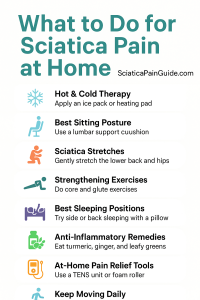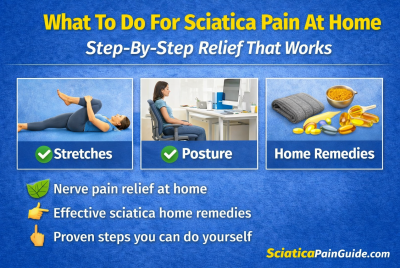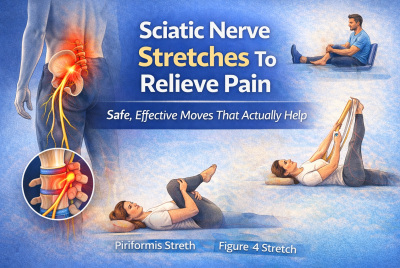What to Do for Sciatica Pain at Home: Practical Relief That Really Works
🔥 When Sciatica Pain Takes Over Your Life
If you’re searching for what to do for sciatica pain at home, you may already be dealing with burning, shooting, or electric pain running from your lower back down your leg. This kind of nerve pain can make it hard to sit, sleep, work, or even enjoy a simple walk. Sciatica doesn’t just hurt — it disrupts your daily routine and your mood.
The good news? There are safe, practical, and science-backed things you can do right at home to ease inflammation, calm the sciatic nerve, improve mobility, and prevent future flare-ups. This guide walks you through everything: causes, symptoms, stretches, treatments, natural remedies, posture tips, lifestyle changes, and more.
Let’s dive into relief you can use today.
🧩 What Causes Sciatica Pain? (Nerve Compression & Common Triggers)
Understanding the root problem helps you decide what to do for sciatica pain at home that actually works.
Common Causes Among U.S. Adults
-
Herniated disc (most common cause)
A bulging disc presses on the sciatic nerve. -
Degenerative disc disease
Disc thinning and age-related wear irritate the nerves. -
Piriformis syndrome
A tight hip muscle compresses the nerve. -
Spinal stenosis
Narrowing of the spinal canal (especially adults 50+). -
Poor posture from long sitting hours
Common among office workers, drivers, and remote employees. -
Overuse injuries or sudden strain
Lifting, twisting, or slipping can trigger an acute flare-up.
Sciatica isn’t a diagnosis — it’s a symptom of nerve compression. That’s why home treatment must target inflammation and mobility.
⚡ Symptoms of Sciatica Pain (What It Feels Like)
Common sciatica symptoms include:
-
Sharp, burning, or shooting pain
-
Numbness or tingling in the leg
-
Pain that worsens while sitting
-
Trouble bending, lifting, or twisting
-
Weakness in the leg or foot
-
Electric shock sensations
-
Relief when lying flat or walking slowly
If these sound familiar, let’s move into the most effective things to do for sciatica pain at home.
🔥 What to Do for Sciatica Pain at Home (Best Home Relief Methods)
These are the most recommended home treatments by physical therapists, chiropractors, and pain specialists.
❄️ Hot & Cold Therapy for Sciatica (Reduce Inflammation Fast)
Cold Therapy
Best during the first 48–72 hours of a flare-up.
-
Apply an ice pack for 15–20 minutes
-
Repeat 2–3 times daily
-
Reduces swelling around the nerve
Heat Therapy
After inflammation calms, heat improves blood flow and relaxes tight muscles.
Great options:
-
Heating pad
-
Warm bath
-
Warm compress
Pro tip: Alternate heat and ice for stubborn episodes.
🪑 Best Sitting Posture for Sciatica Relief (Ergonomic Adjustments)
Poor posture is one of the top sciatica triggers for U.S. desk workers.
What helps:
-
Use a lumbar support cushion
-
Keep your feet flat on the floor
-
Adjust chair height so hips are slightly above knees
-
Try a standing desk as part of your day
-
Take posture breaks every 30 minutes
Even small ergonomic improvements can dramatically reduce nerve pressure.
🧘♀️ Sciatica Stretches You Can Do at Home (Mobility for Nerve Relief)
Stretching is one of the most effective at-home treatments for sciatica.
🍑 Piriformis Stretch
-
Lie on your back
-
Cross one ankle over the opposite knee
-
Pull legs gently toward chest
This targets the piriformis muscle, a major source of nerve compression.
🧘 Hamstring Stretch
-
Sit with one leg extended
-
Lean forward gently, keeping your spine straight
Tight hamstrings often worsen sciatica.
🐱 Cat–Cow Stretch
-
On hands and knees
-
Slowly arch and round your back
This mobilizes the spine and reduces stiffness.
Tip: Hold each stretch for 20–30 seconds and avoid bouncing.
💪 Strengthening Exercises for Sciatica (Core & Glute Stability)
Strengthening protects your back by supporting the spine and stabilizing the pelvis.
Great at-home exercises:
-
Glute bridges
-
Bird-dog
-
Pelvic tilts
-
Wall sits
-
Modified planks
These exercises build strength without stressing the sciatic nerve.🛏️ Best Sleeping Positions for Sciatica (Better Rest, Less Pain)
Sleep can either relieve or worsen sciatica.
Try:
-
Side sleeping with a pillow between the knees
-
Back sleeping with a pillow under your knees
-
Avoid stomach sleeping — it strains the spine
A medium-firm mattress usually offers the best support for nerve pain.
🌿 Anti-Inflammatory Home Remedies (Food, Supplements & Herbal Support)
Inflammation fuels nerve pain. These remedies help calm it naturally.
Anti-Inflammatory Foods
-
Salmon, tuna, sardines
-
Berries
-
Leafy greens
-
Olive oil
-
Turmeric
-
Ginger
Popular Supplements in the U.S.
-
Omega-3s
-
Turmeric + black pepper
-
Magnesium glycinate
-
Vitamin D
-
Alpha-lipoic acid (ALA)
- Sciatica Pro+
Always consult your healthcare provider before starting supplements.
🩹 At-Home Pain Relief Tools (Simple & Effective)
These devices are widely used for sciatica relief in the U.S.:
-
TENS unit – nerve stimulation for pain control
-
Massage gun – releases tight muscles
-
Foam roller – mobility and tension relief
-
Lumbar back brace – temporary support for flare-ups
-
Back traction stretcher – relieves spinal pressure
These tools support recovery but shouldn’t replace long-term strengthening.
🚶 Keep Moving Daily (Low-Impact Movement for Nerve Health)
Contrary to popular belief, bed rest makes sciatica worse.
Try:
-
10–15 minute walks
-
Gentle stretching during breaks
-
Avoiding long sitting periods
Movement increases circulation and speeds healing.
🌿 Natural Remedies for Sciatica Relief (Holistic Techniques)
These natural, low-risk remedies complement physical therapy and stretching.
🌬️ Deep Breathing & Relaxation Techniques (Ease Muscle Tension)
Stress tightens muscles and worsens nerve pain.
Try:
-
Box breathing
-
Belly breathing
-
Guided relaxation tracks
This helps reduce tension in the lower back and hips.
🧘 Yoga for Sciatica Relief (Gentle Poses for Nerve Decompression)
Safe, helpful poses include:
-
Child’s pose
-
Cobra pose
-
Seated forward fold
Yoga combines stretching with relaxation — a powerful combo for relief.
🌿 Herbal & Topical Remedies (Anti-Inflammatory Boost)
Popular natural options:
-
Arnica gel
-
Turmeric capsules
-
White willow bark
-
Boswellia extract
Topicals are good for immediate localized relief.
💆 Self-Massage Techniques for Sciatica (Release Tight Muscles)
Try:
-
Tennis ball under the glute
-
Slow circular glute massage
-
Gentle hip rotator pressure
-
Light lower back massage (avoid the spine)
Never press directly on the sciatic nerve.
🧩 Lifestyle Changes to Prevent Future Flare-Ups (Daily Habits for Long-Term Relief)
Sciatica often returns without consistent habits. These changes help prevent flare-ups.
🪑 Improve Home & Office Ergonomics (Standing Desk, Lumbar Cushion)
-
Raise the monitor to eye level
-
Use an ergonomic chair
-
Keep your pelvis neutral
-
Use lumbar support cushions
-
Try alternating between sitting and standing
🚶 Build Movement Into Your Day (Walking, Micro-Stretches)
-
Walk during breaks
-
Use a step counter
-
Do 2-minute stretch breaks
-
Avoid long static positions
📦 Safe Lifting Techniques (Protect Your Spine)
-
Bend at the knees, not the waist
-
Keep objects close to your body
-
Avoid twisting while lifting
-
Use both hands
⚖️ Maintain a Healthy Weight (Reduce Nerve Pressure)
Extra weight increases spinal compression.
Even losing 5–10 lbs can significantly reduce sciatica frequency.
☕ Manage Stress & Muscle Tension (Mind-Body Relief)
Elevated stress = tighter muscles = more pain.
Try:
-
Meditation
-
Gentle yoga
-
Warm baths
-
Relaxation audio
Consistency matters more than duration.
🏥 When to See a Doctor or Chiropractor (Red Flags You Shouldn’t Ignore)
Seek medical care if you experience:
-
Pain lasting more than 4–6 weeks
-
Severe numbness or weakness
-
Loss of bladder or bowel control (911 emergency)
-
Sciatica after a major fall or accident
-
Fever paired with back pain
-
Sudden foot drop
-
Pain so severe you can’t walk or sleep
Professionals who treat sciatica:
-
Physical therapists
-
Chiropractors
-
Pain management specialists
-
Orthopedic doctors
-
Neurosurgeons (severe cases)
❓ FAQs – What People Also Ask About Sciatica Pain at Home
1. What is the fastest way to relieve sciatica at home?
Ice, gentle stretching, heat therapy, and short walks offer the quickest relief.
2. Should I rest or move with sciatica?
Movement is better. Avoid prolonged bed rest.
3. What should I avoid with sciatica?
Twisting, heavy lifting, long sitting, and high-impact exercise.
4. Can massage help sciatica nerve pain?
Yes — especially glute and piriformis massage.
5. How long does sciatica last?
Most cases improve within 2–6 weeks with proper home care.
6. Is walking good for sciatica?
Yes, walking improves circulation and reduces nerve tension.
7. Can sciatica go away on its own?
Many cases resolve naturally with movement, stretching, and lifestyle changes.
💬 Conclusion – You Can Take Control of Sciatica Pain
When you understand what to do for sciatica pain at home, you take back power over your body and your life. With the right posture habits, daily movement, anti-inflammatory strategies, and consistent stretching, you can reduce pain and prevent future flare-ups.
Healing may take time — but every small step counts. Stay patient, stay consistent, and trust the process. Relief is possible.
⚠️ Medical Disclaimer
This article is for educational purposes only and does not replace professional medical advice, diagnosis, or treatment. Always consult a qualified healthcare provider before starting new exercises, supplements, or treatments.

- Sciatica Exercises You Can Do at Home
- Lifestyle Changes to Stop Sciatica from Returning
- How Long Does Sciatica Last in Older Adults





